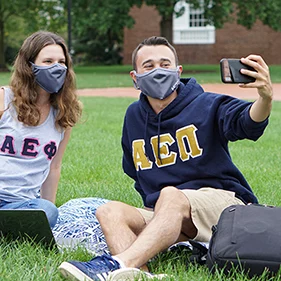Masks, Majors and Mentors

Ronni Isenberg, student president of Syracuse University Hillel, spent her summer brainstorming field trips and creating breakfast menus for FreshFest, a welcome event for incoming Jewish students that takes on many forms at Hillels across the nation. With only one day’s notice, Isenberg suddenly had to pivot all of her plans for in-person activities to a virtual format.
New York state had increased restrictions on out-of-state travelers at the end of July, so all incoming freshmen would have to quarantine once arriving on campus. Syracuse Hillel staff told Isenberg, a senior social work major, that she would have to organize a FreshFest event that lasted two weeks rather than two days.
Undeterred, Isenberg began creating over 20 creative Zoom programs, including Netflix watch parties, Greek life panels and a virtual dorm hangout, where students could meet other Jewish freshmen in their buildings.
For Isenberg, being co-chair of FreshFest had been a dream since her own freshmen year. Despite the time crunch of organizing this year’s FreshFest, she still felt the signature program cemented her legacy at Syracuse Hillel.
“I attended the last program of FreshFest, and I cried in front of everyone on the Zoom call because I was so proud of the work we’d all done,” Isenberg said. “The Jewish future at Syracuse now rests on the shoulders of the freshmen, and it’s so important to me that they see the incredible, endless opportunities and lessons that Syracuse Hillel has to offer.”
The 96 freshmen and upperclassmen mentors who attended the programs from Aug. 3-14 reaped the benefits of Isenberg’s dedication.
“My favorite event was the virtual dorm hangout,” said Alexandra Lobel, a freshman planning to study television, radio and film. “It was nice to find people who were in the same dorm as me, and it made me feel a little less overwhelmed when it came to making friends in quarantine.”
All across the country, local Hillels have had to rearrange their freshmen welcome programs to comply with coronavirus safety guidelines.
For University of Southern California Hillel, this meant adapting its own FreshFest, which usually takes the form of a two-day camping retreat, to a series of online panels led by First-Year Engagement Fellows (FEFs).
Although this isn’t what the FreshFest co-chairs had originally planned, the virtual landscape allowed for more personalized interactions between the 80 freshmen and 30 FEFs who participated. One of those opportunities included pairing new students with mentors from the same hometown to give them a sense of home at Hillel.
“Having Hillel as your first place of reference when you get to college is really what makes it a home away from home,” said Elliotte Orlove, one of the three student FreshFest co-chairs. “For this year specifically, I wanted the incoming students to know they have a network of people they can reach out if they feel isolated while social distancing.”
At the University of Arizona Hillel Foundation, student leaders worked with staff to bring back the First Year Students of Hillel (FYSH) mentoring program. The year-long initiative, which pairs freshmen with upperclassmen mentors based on mutual majors and interests, recently began with a virtual game night. So far, 30 freshmen and 10 upperclassmen have signed up.
“People are craving community and a way to connect since there’s so much that isn’t happening organically anymore,” said Abbii Cook, UA Hillel’s assistant director.
When one of her students, Elise Nochomovitz, approached her earlier in the year about rekindling FYSH, Cook jumped at the idea.
“One of the great things about this program is there’s no deadline for freshmen to sign-up,” Nochomovitz said. “They can join whenever they’re ready, whether that be in July or in May. I just want there to be go-to people that first-year students can reach out to with any questions or concerns at any time.”
Mentoring programs were also a critical aspect of Ohio State University Hillel’s welcome initiatives. They have proved especially helpful for supporting students’ mental health during periods of uncertainty and isolation.
“Before I got to campus, my Hillel mentor, Shayna, emailed me introducing herself and explained how Hillel would safely operate during this time,” said Rachel Salzstein, an incoming freshmen planning on studying neuroscience. “I felt much more at ease hearing from her and I know she has my back and will be here for me whenever I need it. Hillel is a safe zone for me.”
OSU Hillel has also organized a socially distanced candle lighting ceremony on Shabbat and an outdoor ice cream social, which over 400 new and returning students attended.
For Jamie Schachter, OSU Hillel’s director of Jewish student life, these programs were a chance to emulate safe ways to make connections this school year.
“We want students to know that Hillel is still here and is a safe and healthy place to be,” Schachter said. “We’re creating Jewish life in a cautious way by following the guidelines, and we want students to look up to us in being responsible and doing our part.”
Dionna Dash is part of the inaugural Hillel International Writers Program, a five-month opportunity for Jewish undergraduate students interested in journalism.